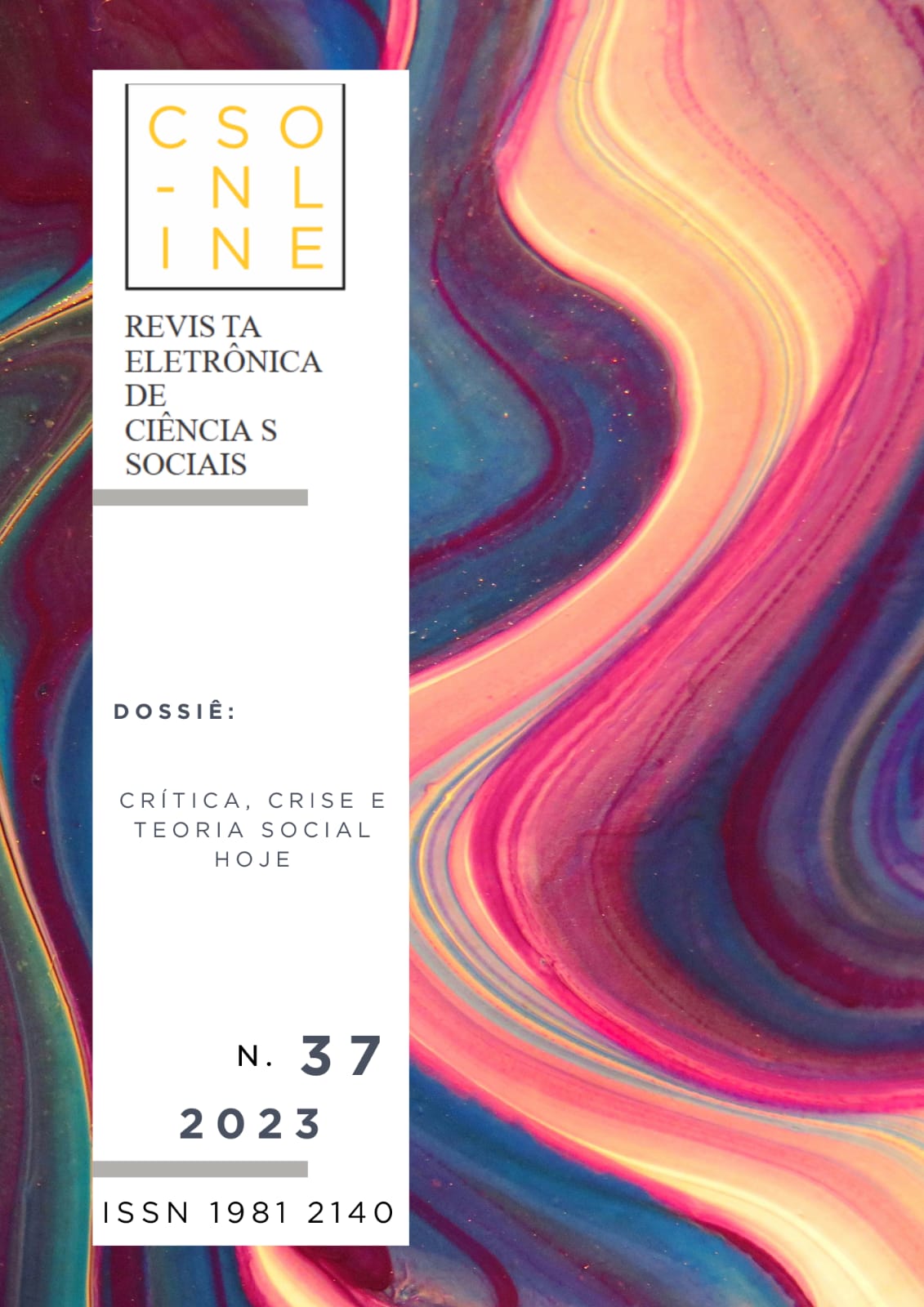Representations of crisis and criticism on the lunar side of capitalist modernity
Comments about Rodrigo Cordero's book
DOI:
https://doi.org/10.34019/1981-2140.2023.42930Keywords:
Critique, Crisis, ColonialityAbstract
The book Critique and Crisis: on the fragile foundations of social life published by Ateliê de Humanidades Editorial (Rio: 2022) by Rodrigo Cordero invites us to rethink the ontological foundations of critique at a time when the crisis of power devices seems to be perpetuating itself to produce what C. Castoriadis (1992) summarized very pertinently 30 years ago in "The fragmented world". My approach to the problem intentionally departs from the Eurocentric perspective that prioritizes the theoretical and philosophical truths of the so-called "classics". Instead, I believe it is necessary to value the epistemological justice through which a plurality of perspectives can be recognized, such as those on the frontiers of knowledge, which allow us to problematize the current world system more objectively as the result of various movements that Dussel (1993) calls transmodernity. As we will see below, the challenge of rethinking the critique of the crisis or the crisis of critique in the current context cannot be answered from the epistemic and moral categories inherited from the Eurocentric program. This has precise historical limits given by the imperial, warlike and racist imaginary that markedly impregnates the representations of Western modernity, separating what the colonizers call superior and inferior cultures and ethnicities. So the critique formulated from the borders aims to break with this imperial and colonial imaginary founded on a strong hierarchy of domination that historically discriminates against peoples and individuals according to a racist and patriarchal scale of valuation.
Downloads
References
Referências:
Agamben, G. (2010) Homo sacer. O poder soberano e a vida nua (I). Belo Horizonte: Editora UFMG
Bhabha, H. (2003) O local da cultura. Belo Horizonte: Editora UFMG
Bloch, E. (1986) The Principle of Hope. Volume One. Cambridge: The MIT Press
Castoriadis, C. (1975) L’institution imaginaire de la société. Paris: Seuil
____________(1992) As encruzilhadas do labirinto III: o mundo fragmentado. Rio de Janeiro: Paz e Terra
Dussel, E. (1993) O encobrimento do outro. A origem do mito da modernidade. Petrópolis: Vozes
Espósito, R. (2007) Terza persona. Politica della vita e filosofia dell'impersonale. Torino: Einaudi
Flusser, V. (2011) Pós-história. São Paulo: Annablume.
Grosfoguel, Ramón (2008). “Para descolonizar os estudos de economia política e os estudos pós-coloniais: Transmodernidade, pensamento de fronteira e colonialidade global”. Revista Crítica de Ciências Sociais, n. 80, p.115-147
Guha, R. (1997) A subaltern studies reader (1986-1995). Minnesota: Minnesota University
Hegel, G.W.F. (1999) Filosofia da História. Brasília, Editora da UnB, 1999;
Kant, I. (1993) Observações sobre o sentimento do belo e do sublime. Ensaio sobre as doenças mentais. São Paulo: Papirus
Laotur, B. (2020) Diante de Gaia. Oito conferências sobre a natureza no antropoceno. Rio/São Paulo: Ateliê de Humanidades Editorial/UBU
Leibniz, G. W. (1979) Correspondência com Clarke. Trad. C. L. Mattos. São Paulo: Abril Cultural. Vol. I., [1715-6]).
Mbembe, A. (2011) Necropolítica. Madrid: Melusina.
Mignolo, Walter (2000), Local Histories/Global Designs: Essays on the Coloniality of Power, Subaltern Knowledges and Border Thinking. Princeton: Princeton University Press.
_______________ (2011) The darker side of western modernity: global futures, decolonial options. Durham: Duke University Press.
Quijano, A. (2003) “Colonialidad del poder, eurocentrismo y América Latina In: E. Lander (Compilador) La colonialidad del saber: eurocentrismo y ciencias sociales. Perspectivas latinoamericanas. Buenos Aires: CLACSO.
Sousa Santos, B. (2008) A gramática do tempo. Para uma nova cultura política. 2ª.edição, São Paulo: Cortez Editora.
Spivak, Gayatri (1988), In Other Worlds: Essays in Cultural Politics. New York: Routledge, Kegan and Paul.
Wallerstein, I. (1998) Utopistica ou as decisões históricas do século XXI. Petrópolis: Editora Vozes.
Downloads
Published
How to Cite
Issue
Section
License
Copyright (c) 2024 CSOnline - REVISTA ELETRÔNICA DE CIÊNCIAS SOCIAIS

This work is licensed under a Creative Commons Attribution 4.0 International License.
Todos os artigos científicos publicados na CSOnline – Revista Eletrônica de Ciências Sociais estão licenciados sob uma Licença Creative Commons







